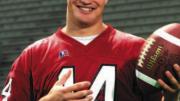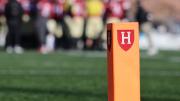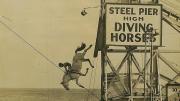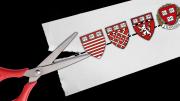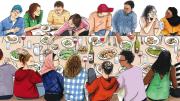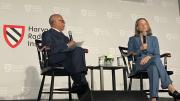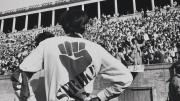Though the Harvard football team runs one of the most sophisticated offensive sets in the country, the team also likes to play what they call "backyard ball"—the kind of football that once started with plays drawn with a stick in the dirt, or invisibly diagrammed on the quarterback's left palm. "Sometimes, you have to make up plays as you go," quarterback Ryan Fitzpatrick '05 says cheerily. "Scrambling around is a huge part of our offense. You sit in the film room and design an offensive attack, and then on Saturday our biggest gains come from broken plays, making things happen. It's so frustrating for the other teams' coaches. I love that style—that's the way I love to play the game."
Fitzpatrick shines in that improvisational mode because he may well be the most versatile quarterback in the Ivy League: he can pass from the pocket or roll out and—at 6 feet, 3 inches, and 220 pounds—run with bruising power. "I've never been one to shy away from contact," he says. "I always try to initiate the contact and run over anyone who tries to tackle me." Head football coach Tim Murphy, now in his eleventh year, says, "I've never had anybody in my career who's as versatile as Ryan. He's the most effective quarterback I've coached in terms of athletic ability, mental and physical toughness, and the ability to make clutch plays. I wouldn't trade him for any other player in the league."
Last fall, injuries dogged the entire Harvard squad; there were 17 surgeries for Crimson players during or after the season. Fitzpatrick suffered a broken bone in his right (throwing) hand, plus knee, ankle, and shoulder injuries. By the Yale game, so banged up that he was virtually immobilized, he could not scramble or run at all. (Despite missing three full games, he was the Crimson's second leading rusher, behind phenomenal freshman Clifton Dawson.) "Yale was a huge team effort," he says. "Before the game, the offensive line [including two future National Football League players, seniors Jack Fadule and Jamil Soriano] made it a goal for me not to be touched, [so I] was able to sit back in the pocket, survey the field, and throw the ball." He passed for four touchdowns before 53,000 in New Haven, as the Crimson punished Yale, 37-19, to cap a 7-3 season.
At The Game the previous year, Fitzpatrick took over for injured starter Neil Rose '03 and ran for two touchdowns in a 20-13 victory. "For the majority of seniors, the Yale game is the last football game they will ever play," he says. "It's been most satisfying for me to help send the seniors off with such a great taste in their mouths—to end up on top."
Fitzpatrick was a freshman when Rose directed the Crimson to a perfect 9-0 season in 2001, and the older athlete "set a precedent for a lot of the quarterbacks," Fitzpatrick says. "Namely, you don't make mistakes at quarterback. Neil limited turnovers and mental errors to an absolute minimum." Rose would watch film with Fitzpatrick and the other Crimson signal-callers, explaining why he made certain decisions before the snap, or why he would not go to a specific receiver on a particular play. "At the beginning of freshman year, to me it looked like chaos on the field," Fitzpatrick says. "I knew the offense, but the defense moved so fast! But the game moves so slowly for me now. Through playing experience and watching film you are able to anticipate and slow the game down a lot. You know what the defense is going to do before they do it."
An extremely accurate passer, Fitzpatrick began last season with a streak of 167 passes thrown without an interception. He opened that campaign against Holy Cross by setting Harvard's single-game total offense record (471 yards) in a 43-23 win, throwing for 359 yards and running for 112 more. This year, Fitzpatrick will target what Murphy says may be "the best receiving group we've had since I have been here." Senior Brian Edwards is not only "a burner—he has straight speed," Fitzpatrick says, but is "an unbelievable talent. He has that 'X' factor, that playmaking ability. Brian [becomes] two-dimensional, so nobody can tackle him, and every time he gets the ball everyone is on the edge of their seats, anticipating his next move." Receivers Corey Mazza '07 and Ryan Tyler '06 also have explosive potential. And last year, tailback Clifton Dawson did two things that no Ivy League freshman has ever done: he ran for more than 1,000 yards and made the All-Ivy First Team.
These are good auguries of a winning final campaign for Fitzpatrick, who is now 100 percent healthy. An economics concentrator, he's had summer jobs at a hedge fund and, most recently, in sports management with the Boston Celtics. He does miss his native Arizona, where everyone has air-conditioning and a swimming pool. "It never gets too hot for me," he says, before adding, "Well, 115 degrees is a little much—when you can't even walk on the sidewalk barefoot." Good practice, though, for scrambling out of the pocket.
